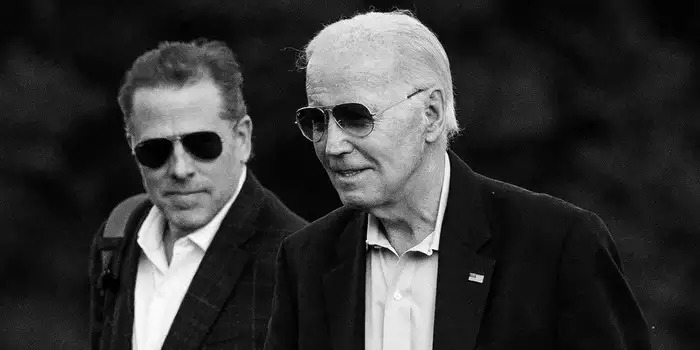- Insider has learned the identities of two Hunter Biden “friends” who were also buyers of his art: Elizabeth Hirsh Naftali and Kevin Morris.
- Internal gallery documents reveal that sales of Hunter Biden’s art brought in $1.3 million.
On the campaign trail, President Joe Biden pledged that there would be an “absolute wall” between his official duties and his family’s private business interests. The Biden White House repeatedly made reference to that wall when responding to questions about the fledgling art career of Hunter Biden, the president’s son. In 2021, when a New York art gallery debuted Hunter Biden’s paintings with asking prices as high as $500,000, the White House said that Hunter Biden’s team had a process for carefully vetting buyers, and that their identities were known only to the gallery, and not to Hunter Biden himself. The messaging seemed to suggest that Hunter Biden’s art patrons came from a rarified universe of collectors who had nothing to do with the hurly burly of politics.
Neither of those things has turned out to be the case. Hunter Biden did in fact learn the identity of two buyers, according to three people directly familiar with Hunter Biden’s own account of his art career. And one of those buyers is indeed someone who got a favor from the Biden White House. The timing of their purchase, however, is unknown.
That buyer, Insider can reveal, is Elizabeth Hirsh Naftali, a Los Angeles real estate investor and philanthropist. Hirsh Naftali is influential in California Democratic circles and is a significant Democratic donor who has given $13,414 to the Biden campaign and $29,700 to the Democratic National Campaign Committee this year. In 2022, she hosted a fundraiser headlined by Vice President Kamala Harris.
Insider also obtained internal documents from Hunter Biden’s gallery showing that a single buyer purchased $875,000 of his art. The documents do not indicate the buyer’s identity, which is also unknown to Insider at this time.
In July 2022, eight months after Hunter Biden’s first art opening, Joe Biden announced Hirsh Naftali’s appointment to the Commission for the Preservation of America’s Heritage Abroad. It is unclear whether Hirsh’s purchase of Hunter Biden’s artwork occurred before or after that appointment. Membership on the commission is an unpaid position that is often filled by campaign donors, family members, and political allies — the same crowd that often winds up with US ambassadorial appointments. Hirsh Naftali’s fundraising activities mark her as the kind of well-connected donor who often wins such appointments, regardless of any relationship they might have with the president’s family. But they do not address the possibility that Hunter Biden might have voiced his support for her appointment.
| Also Read: Biden’s Narrative on never discussing business deals with Hunter continues to crumble |
Well, did that happen or not? Did Hunter Biden weigh in with his father about the appointment of Hirsh Naftali?
And did Hirsh Naftali buy Hunter Biden’s art before or after she was appointed?
Insider asked these questions.
Neither the White House nor Hunter Biden’s counsel could offer an answer.
This story will be updated should that change.
Hirsh Naftali did not respond to requests for comment.
An administration official told Insider that her appointment had been recommended to Biden by former House Speaker Nancy Pelosi. They said there was no connection between her art purchases and her appointment. They said that Hirsh Naftali was deeply involved with Jewish causes in Los Angeles and Israel — valuable background for a commission that works to preserve many historic Jewish sites across Europe. They noted her service on a policy board at the RAND Corporation, a prominent think tank.
They did not offer a timeline.
“Hunter Biden is a private citizen who is entitled to have his own career as an artist,” said Ian Sams, a White House spokesperson. “We are not involved in his art sales, and any buyers of his art are not disclosed to the White House.”
Bruce Weinstein, a professional ethicist and ethics trainer, told Insider that the timing of Hirsh Naftali’s purchase was significant. “If it was done after her appointment, and she likes the painting, it’s less of an issue,” he said. “It’s more of an issue if she’s deciding to buy it beforehand. Then it might be perceived as a quid pro quo.”
But regardless of the timing, Weinstein said, “if you really wanted to choose the most ethically appropriate course of action, that would not involve any conflict of interest, real or perceived, then you don’t buy the painting.”
The Commission for the Preservation of America’s Heritage Abroad is a public agency charged with preserving European historical sites. In the past, Hunter Biden has privately suggested that he could arrange to have friends seated on the commission. Eric Schwerin, Hunter Biden’s longtime business associate, was appointed to the same post by President Barack Obama in 2015. An email apparently from Hunter Biden’s abandoned laptop written that year suggests that he had sway over Schwerin’s appointment. “Eric asked me for one of these the day after the election in 2008,” Biden wrote to a cousin, who had written inquiring about the possibility of a similar appointment for her mother.
Neither Hunter Biden nor Schwerin responded to a request for comment on the email’s contents.
In an emailed statement, Abbe Lowell, Hunter Biden’s counsel, said that Hunter Biden learned the identities of Hirsh Naftali and a second buyer after they had purchased his art through his gallery, because they were his friends. “The gallery sets the pricing and handles all sales based on the highest ethical standards of the industry, and does not disclose the names of any purchasers to Mr. Biden,” Lowell wrote.
“Names of buyers are strictly confidential,” wrote Georges Bergès, Hunter Biden’s gallerist, in an email. “Any attempt to get them is illegal and will be reported to the proper authorities.”

Document points to $875,000 mystery buyer
Internal Georges Bergès Gallery documents obtained by Insider, a selection of which are published below, show that a single buyer purchased 11 Hunter Biden artworks for a total of $875,000. A gallery contract with Hunter Biden’s handwritten edits show him excluding the sales of NFTs from the gallery’s 40 percent commission.
The identity of the $875,000 buyer is unclear. That one buyer represents the majority of the $1,379,000 in receipts that Hunter Biden’s gallery received for his work, the documents show, with the gallery receiving a 40 to 45 percent commission. The $875,000 art buyer resides outside New York and purchased some of Hunter Biden’s largest format works, including a 12-foot-long red-white-and-blue piece painted on sheet metal and entitled “Pandemonium.”
| Also Read: Hunter Biden’s Plea Deal on Hold After Federal Judge Raises Concerns Over The Terms of the Agreement |
The only other art buyer known to Hunter Biden, according to the three people directly familiar with Hunter Biden’s own account, is Kevin Morris, a wealthy Los Angeles attorney who has become Biden’s confidant and financial backer. Morris’s ownership of Biden’s art was previously reported by the New York Times, although a person close to Morris reportedly suggested to the Times that the art may have been a gift, not a purchase. In fact, according to the person familiar with Hunter Biden’s account, Morris purchased the art through Biden’s gallery. In addition to collecting his work, Morris has reportedly lent Hunter Biden upwards of $2 million, helping him pay off back taxes and avoid felony penalties under a June settlement with the Department of Justice. Instead, Hunter Biden pled guilty to two misdemeanor tax charges.
Morris did not respond to a request for comment.
The asking prices for Hunter Biden’s artwork may appear staggering, but they are not unreasonable given the vagaries of the art market according to Charlie Horne, president of Gurr Johns, an art advisory and appraisal company. “There are a ton of terrible artists who get a lot more money,” he said. “If you told me that each of his paintings was a million dollars, and that he’d never had a museum show, that would be one thing. But anything under $100,000 — at those prices, it’s very subjective.”
Kedric Payne, general counsel at the Campaign Legal Center, said that the question of whether the Hirsh Naftali appointment was an ethics violation depended on both the timing of her purchase and whether the art was purchased at fair market prices, or for substantially more, in which case it could be considered a gift.
“Legally, you might not have a problem,” he said. “But with the appearance, it’s a lot to try and explain.”




